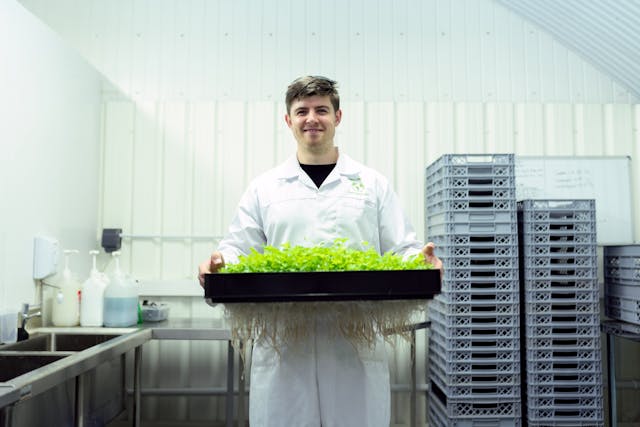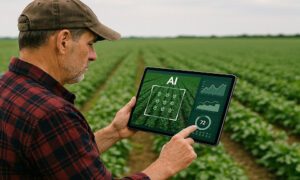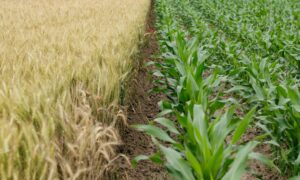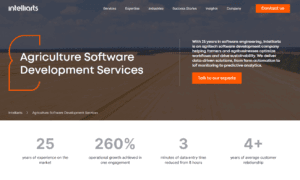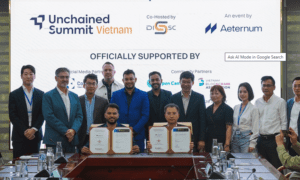The Urgent Need for Sustainable Agriculture
The United Nations designated the 15th November 2022 as the Day of Eight Billion. It marked the approximate date that the global population crossed the 8 billion threshold. Rapid population growth is projected to continue, reaching 9.8 billion in 2050, and 11.2 billion in 2100.
The complex challenges of feeding a growing population are compounded by the effects of global warming – particularly extreme weather events and changes to ecosystems – and diverse factors such as disruptive geopolitical events, inefficiencies in global trade, and urban drift.
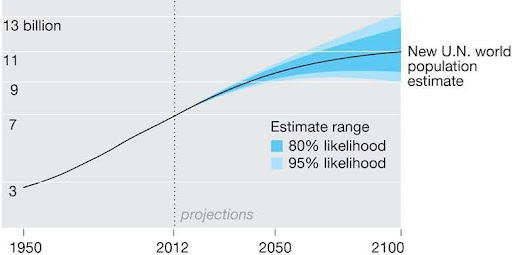
Social stability depends on food security and equitable access to food staples. In many countries, stability also depends upon maintaining a viable and resilient rural economy, and preventing an exodus of agricultural workers and their dependents to urban areas that struggle to absorb them.
The Transformative Power of AgTech R&D
It’s clear that the global agricultural system is increasingly under strain and dozens of countries around the world are currently experiencing food inflation. The interconnected challenges of food insecurity and environmental degradation are inspiring some of the finest minds in the AgTech sector to harness Industry 4.0 technologies and channel them into crop yield optimization and precision agriculture.
The underlying objective of AgTech R&D and investment is to create an abundance of affordable, nutritionally dense, and ethically produced food products, and to enable a seamless – and profitable – transition to sustainable agriculture.
Breakthrough Technologies Enabling Precision Agriculture
Precision agriculture aims to apply the underlying principles of an Industry 4.0 smart factory to agricultural operations. Growers (and agronomists) utilize an array of smart farming technologies that incorporate IoT sensors, AI, drones, robotics, and data analytics to create growing solutions tailored to individual microclimates and specific crops. Beyond field level operations, new technologies can enhance and improve the entire food value chain, reducing waste, and improving consumer choice.
The goal of precision agriculture is to optimize resource use, reduce negative environmental impacts, enhance crop yields and align crop plans with consumer demand. The adoption of advanced technologies can revolutionize the viability of family-run smallholdings, streamline the efficiency of large estates and plantations, enable vertical and urban farming, and promote sustainability on a global level.
Leading Innovators Behind Smart Farming Technologies
The global AgTech or AgriTech sector covers a broad spectrum of innovation that ranges from next generation biogenetics to advanced controlled release fertilizers and AI-driven robotic crop harvesting devices.
The following companies offer an overview of the sector’s diversity and the variety and scope of technological innovation that is driving the new AgTech revolution.
Hydrofarm Holdings Group, Inc. (NASDAQ: HYFM)
Hydrofarm is an important innovator in the implementation of IoT in farming. IoT (the internet of things) is essentially a network of physical devices that utilizes sensors, software, and connectivity to provide real time data via an internet connection. Precision agriculture depends on the availability of accurate data and Hydrofarm is an innovator in the development of IoT connected devices for controlled environment agriculture.
Hydrofarm initially built its reputation around hydroponics, grow lights and other sophisticated gardening and growing equipment. Today it markets over 6,000 items that cover almost every aspect of controlled crop production. Hydrofarm offers precision agriculture solutions for the entire crop management cycle from propagation to harvesting, including atmospheric automation, lighting, water management, irrigation and fertigation, and growing media.
The next generation sensors and robotics designed by Hydrofarm are at the cutting edge of IoT in farming. Solutions like Autopilot Digital Controllers and HM Digital meters can reduce overheads, improve productivity and empower growers with an astonishing level of control over their agricultural operations. This level of flexibility and specialization is key to sustainability and improved crop yields.
ICL Group (NYSE: ICL) (TASE: ICL)
ICL Group is one of the world’s leading specialty minerals companies and is also one of the largest fertilizer manufacturers by volume. The company is contributing to the development of precision agriculture on several levels. One of its flagship controlled release fertilizers eqo.x utilizes a fully degradable release technology to provide advanced crop nutritional solutions for open field agriculture. eqo.x provides crop yield optimization by increasing nutrient use efficiency (NUE) by up to 80%.
Another ICL Group innovation is increasing sustainability further down the food supply chain. FruitMag™ leverages the company’s specialty minerals expertise to utilize a sustainable magnesium-based post-harvest treatment to reduce the loss of citrus fruit. FruitMag™ is designed as a healthier alternative to traditional fungicide-based treatments.
ICL Group is also promoting sustainability through data-analytics and software. Agmatix is an agro informatics company that is part of ICL Group’s AgTech digital solutions. Agmatix platforms are empowering users worldwide with a suite of advanced digital agronomy solutions.
KWS SAAT SE & Co. KGaA (KWS.DE)
KWS SAAT is one of the world’s largest seed products and is a major biotechnology innovator. Much of the company’s R&D is focused on developing new seed varieties to meet the challenges of climate change and to enable growers to farm marginal lands. As well as using traditional breeding methods, KWS SAAT is pioneering digital phenotyping, genetic engineering and genome editing techniques.
The ability to adapt staple food crop seeds like cereals and vegetables for greater resilience and improved crop yields and nutritional optimization is fundamental to achieving genuine sustainability in the face of climate change and associated extreme weather events. KWS SAAT is also working to develop seed varieties that reduce the need for treatment with chemical pesticides and require less fertilizer.
To put the scale of KWS SAAT’s commitment to seed innovation into perspective, it’s worth considering the company’s recent completion of a 51 million euros seed inventory complex at Einbeck in Germany. The 13,000 square meter facility will hold an estimated 1.3 million seed lots of vital staples like beets and peas. KWS SAAT is planning an additional 4,600-square-meter complex for Phytopathology research into plant diseases.
Conclusion: Completing the Journey to Sustainability in Agriculture
The combined pressures of a world population that is expected to reach 11 billion by the end of the century, and unstable weather patterns caused by climate change, are mandating an urgent improvement in crop yields and a transformational shift to sustainability.
AgTech innovation and the utilization of Industry 4.0 technologies at field level by some of the world’s top companies is powering precision agriculture. Advanced crop yield optimization methods, digital solutions and data analytics, and the creation of ‘smart farms’ through the bold incorporation of IoT in farming has launched a new agricultural revolution
The wider vision of a sustainable global agricultural system, that delivers an abundance of affordable food, could be a reality within a decade.

